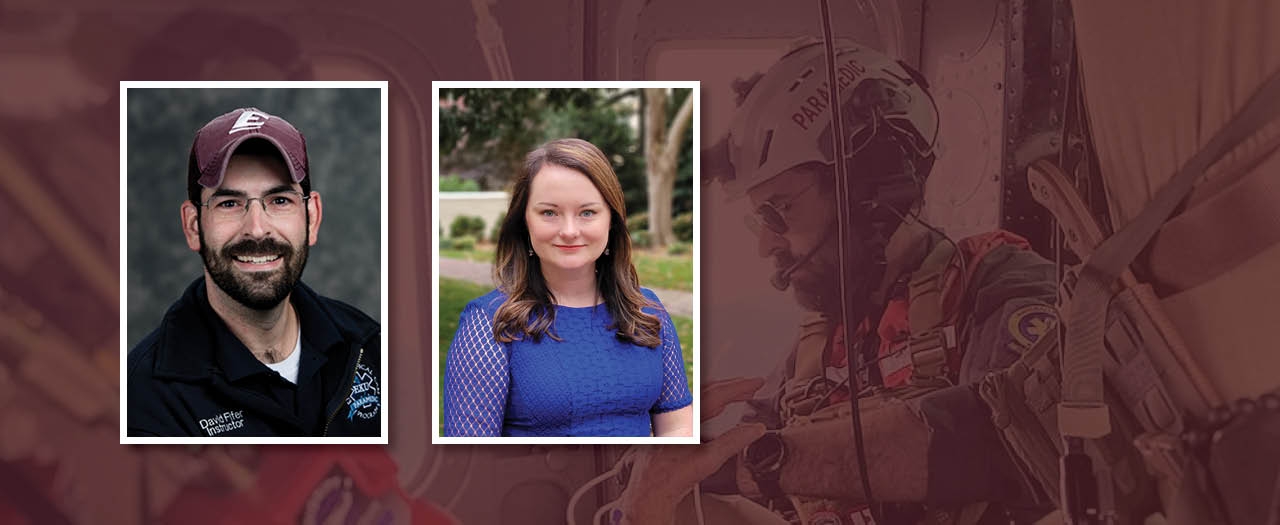David Fifer, ’07 ’17, and his wife, Rebecca, ’08, were among the brave individuals working to help the families devastated by the flooding in eastern Kentucky.
David serves as an assistant professor in EKU’s Emergency Medical Care/Paramedic program, and director of the Center for Wilderness & Outdoor Public Safety. On top of that, he volunteers as a paramedic for the Kentucky State Police’s rescue helicopter.
No stranger to flood response, David flew in the rescue helicopter for a few days to perform hoist rescues in eastern Kentucky.
“It’s a little different than some of the floods that I've responded to, like in the flooding after Hurricane Harvey in Houston, where there were pockets of the city that got affected really badly. You don’t want to downplay that,” David said. “But it’s a little different to have neighborhoods of a city that are destroyed versus entire communities—these dots on the map in eastern Kentucky—that essentially got wiped out. That’s the thing that really struck me seeing that from the air.”
He said the people he rescued were relieved to get help. Although he witnessed devastation in his rescue mission, he said he also saw a lot of heroism.
While David was performing helicopter rescues, his wife Rebecca, helped to coordinate the response needs for the flooding. She’s a finance and administration section chief with a federal incident management team for the Administration for Strategic Preparedness and Response (ASPR) with the U.S. Department of Health and Human Services (HHS). Incident management teams are employed to oversee the response when local and state resources are overwhelmed. In her position, she’s been deployed to wildfires, hurricanes, missions at the U.S. border, COVID and other national security events.
Although her team wasn’t deployed to help with the Kentucky flooding, she volunteered to help with the Bluegrass IMT (incident management team), which was created after the destructive Mayfield tornado last year.
With the Bluegrass IMT, she worked on creating a Situation Report, providing an overview of the conditions, accomplishments and outstanding needs resulting from the flooding. The report was then distributed to the State Emergency Operations Center. Witnessing the impact of the flooding, she also asked for donations from friends and raised $1,500 to purchase supplies for impacted households.
“It was very meaningful to be able to serve my fellow Kentuckians and work alongside them in this response,” Rebecca said. She described the situation as “heartbreaking, but hopeful. I cannot imagine what it would be like to lose my loved ones and everything I owned in such a short amount of time. However, I feel hopeful about the area’s ability to recover. People from around Kentucky and across the U.S. have gotten involved with trying to help the area heal and rebuild.”
Having seen many devastating events in her career, she commented, “Disasters often bring out the best of us even in the worst of times.”
When asked what people can do to help flood victims, David encouraged donations to the Team Kentucky Flood Relief fund. “By donating to the Team Kentucky Fund, funds will go to the right place to help people on the ground,” he said.
David also mentioned a new academic program planned at EKU to directly address multidisciplinary disaster response. Currently referred to as the “all-hazards” degree, the program will provide training in the full spectrum of emergency services, including law enforcement, firefighting, emergency medical care, emergency management and occupational safety, all rolled into a single program of study.
“What happens in these disasters is that all of those different skill sets are called upon,” David said. “And so we’re trying to give a degree option that exposes them [emergency responders] to all those different facets. We’ve just started the process of pulling together all of those different departments in the College of Justice, Safety, and Military Science to figure out which of their courses should make up that degree.”
Eastern Kentucky University has a long history of providing hands-on education that enables graduates to make an impact serving their communities, whether through emergency response, criminal justice, teaching, healthcare, business or many other fields. When others are in need, EKU Colonels, like the Fifers, are ready to help.
